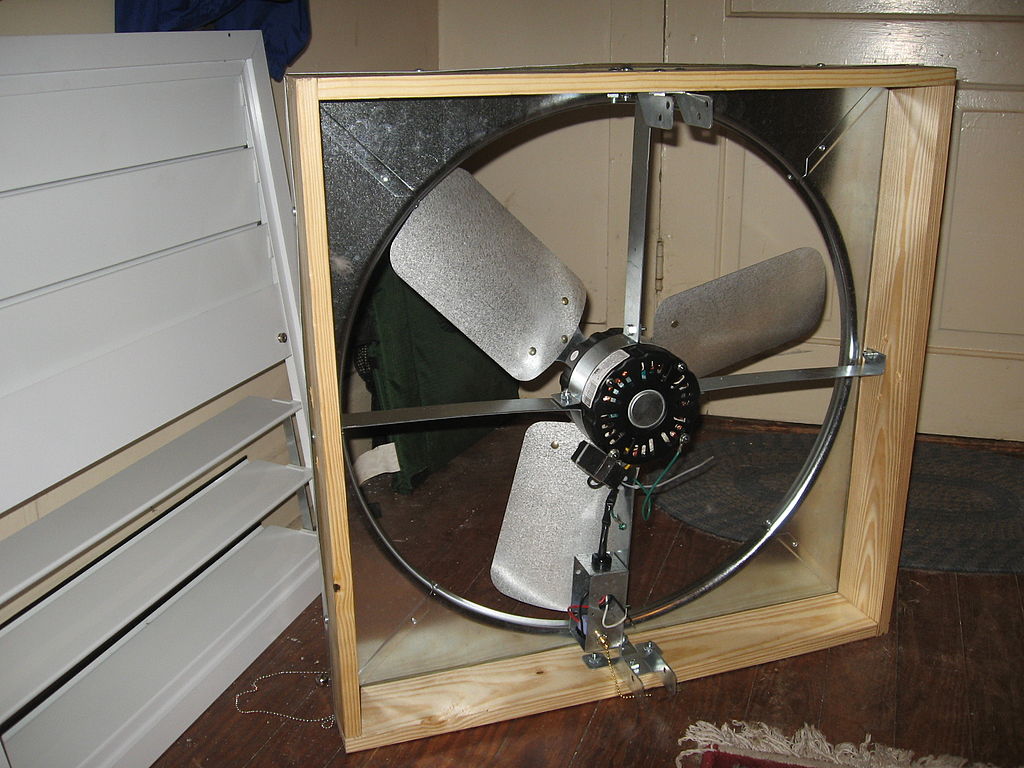Whole House Fan vs Air Conditioning
 hole house fans (AKA attic fans) were first used in the US a century ago, but fell out of favor as air conditioning became common. Now homeowners are taking a second look at this method of home cooling, which offers a host of advantages, along with a few drawbacks. Let’s compare attic fan vs AC cooling so you can make an informed choice.
hole house fans (AKA attic fans) were first used in the US a century ago, but fell out of favor as air conditioning became common. Now homeowners are taking a second look at this method of home cooling, which offers a host of advantages, along with a few drawbacks. Let’s compare attic fan vs AC cooling so you can make an informed choice.
How Does an Attic Fan Work?
First, a quick primer on whole house/attic fan operation. To begin, a powerful fan is installed, usually in the attic (surprise, surprise), over a grille in the floor at your house’s approximate center. You switch on this fan at the end of the day, as the outside air drops below the indoor temperature. At the same time, open several ground-floor windows. The fan draws cool outdoor air into the house and exhausts hot indoor air via the attic vents. When the outside air warms up in the morning, turn off the fan and close the windows to keep in the cool.
By the way, don’t confuse attic fans with powered attic ventilators. Designed to exhaust hot air from the attic, powered attic ventilators often pull conditioned air up from the lower stories (where you want it) to the attic (where you don’t). They also have a strong tendency to backdraft fuel-burning appliances, causing a risk of carbon monoxide in your home. These devices have proved so energy-inefficient and potentially dangerous they’re actually banned in the state of Georgia!
Fan vs AC: Cooling Power
A whole house fan is capable of cooling down a hot home faster than an air conditioning system. You do not have to leave your fan on all day, as is recommended for your A/C (although the A/C can be set at a higher temperature when you’ll be away from house more than several hours). However, the whole house fan will work effectively only when the outdoor air cools down at night to a temperature significantly lower than the air indoors.
Air conditioning functions independently of the air temperature. In addition, your A/C system provides a dehumidification component, which helps your house feel cooler.
Fan vs AC: Energy Efficiency
On average, an attic fan uses an impressive 90 percent less power than an A/C system to cool a home, meaning that your utility bills are likely to be significantly lower.
Talk to a local HVAC pro about optimizing attic fan use in your area. For example, if you live in a city like Jacksonville FL, with its intensely hot and humid summers, your attic fan can replace air conditioning in spring and fall (saving you energy and money), while you’ll rely on the A/C system from June to September.
Fan vs AC: Indoor Air Quality
Fresh air is drawn in through your open windows and circulated throughout the home by a whole house fan. However, if local outdoor air quality is poor – due to a high level of allergens, heavy nearby traffic, or forest fires, for example – air conditioning is preferable, especially if someone in your family suffers from allergies or other breathing problems.
Fan vs AC: Maintenance
To keep your whole house fan clean and smooth-running, just wipe the blades occasionally (shut off the power before doing so, please). Air conditioner maintenance is more time-consuming: changing filters, cleaning the condenser and evaporator coil, etc.
Fan vs AC: Cost
Purchase and installation of a whole house fan ranges from approximately $700-1,500. Cost to buy and install central air conditioning (for a home already fitted with ductwork) is between about $5,000 and $7,000. According to the International Association of Certified Home Inspectors, the expected lifespan of a whole house fan is 15-25 years, compared to 7-15 years for central A/C.
Whole House Fan Disadvantages
Before you rush out to buy a whole house fan, be aware of several disadvantages. Besides the limitations in very hot climates mentioned above, whole house fan installation requires cutting a hole in the ceiling, which must be closed and well insulated in winter. As well, there’s a risk of backdrafting fuel-combustion appliances like gas-powered water heaters or wood stoves.
Laura Firszt writes for networx.com.
Looking for a Pro? Call us (866) 441-6648

Related Experiences

New Ceiling Fans For A New Home

I Needed A New Gas Furnace Install Due To A Cracked Burner



